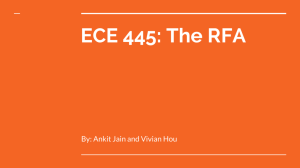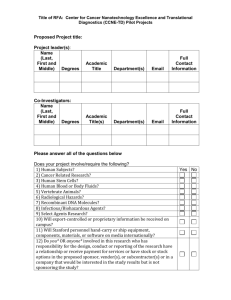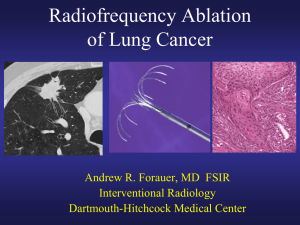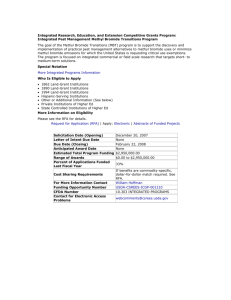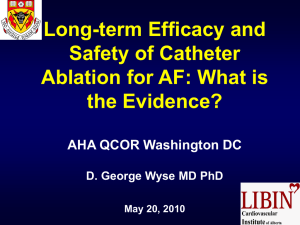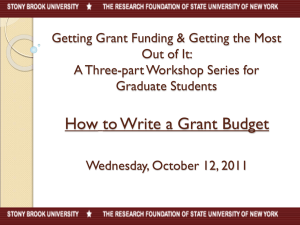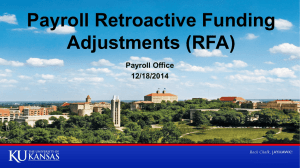Resource Family Approval
advertisement
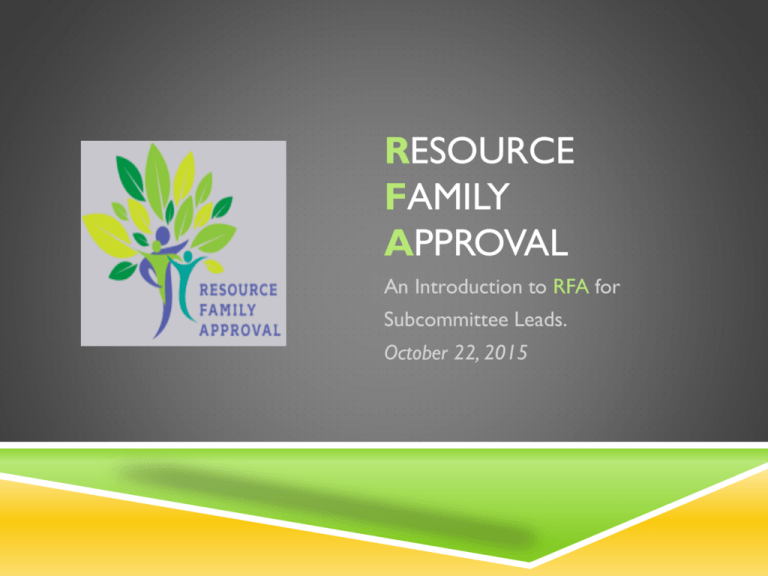
RESOURCE FAMILY APPROVAL An Introduction to RFA for Subcommittee Leads. October 22, 2015 WHY ARE WE HERE TODAY? Introduction to RFA Requirements & Timelines Discuss how your team fits into RFA Obtain your commitment, or designees, to participate in the various subcommittees Feedback/input based on information received today Solicit input on next steps RFA PURPOSE STATEMENT “To implement a unified, family friendly, and child-centered resource family approval process that replaces the existing multiple processes, eliminates duplication, and increases approval standards by incorporating a comprehensive psychosocial evaluation of all families that want to foster, adopt, or provide legal guardianship to a child.” ~ CDSS/RFA WHAT IS RFA? RFA is a new mandatory caregiver approval process that combines elements of the current foster parent licensing, relative approval and approvals for adoption and guardianship and replaces those processes. RFA: Is streamlined: It eliminates the duplication of existing processes. Unifies approval standards for all caregivers regardless of the child’s case plan. Includes a comprehensive psychosocial assessment, home environment check and training for all families, including relatives. Prepares families to better meet the needs of vulnerable children in the foster care system. Allows seamless transition to permanency. LEGISLATIVE BACKGROUND RFA was enacted by legislation sponsored by CWDA in 2007 and expanded through Senate Bill 1013 (Chapter 35, Statutes of 2012). The statute requires the California Department of Social Services (CDSS), in consultation with county child welfare agencies, including Juvenile Probation, foster parent associations and other interested community parties to implement a unified, family friendly and child-centered resource family approval process. EARLY IMPLEMENTERS RFA has been implemented in five counties, San Luis Obispo, Kings, Santa Barbara, Santa Clara and San Francisco. Cohort 2 counties: Butte, Madera*, Monterey, Stanislaus, Orange,Yolo*, and Ventura RFA will be implemented in all counties by January 2017. (Mandatory) RFA ROLES RFA ROLES & RESPONSIBILITIES DPSS Completes Home Environment Assessment (physical plant) Gathers verifications & documents Completes criminal & child welfare background checks Completes permanency assessment Internal & external training of staff & caregivers Ultimately responsible for approvals, denials & rescissions of RFA Ongoing monitoring of personal rights violations and complaints RFA SUBCOMMITTEES Subcommittee Proposed Leads Data/CWS Policy • • Jennifer Hastings Zayda Patton Fiscal/Foster Care • • Gergis Kirnalious Carey Minjarez Training/SDD/CSD • • • Lonetta Bryan Colette Crawford Erika Tucker Forms/Packets • • Rose Duran RAU Supervisor Home Assessment (Physical Plant)/Reassessment • RAU Supervisors (2 co-leads) Permanency Assessment (aka: Home Study) • • • Rose Dixon-Flowers Ida Roath RAU Supervisor Criminal/CPS backgrounds, Complaint Investigations/Appeals • • • Lizz Gravenberg Heidi Lombardi Angela Zuspan Marketing & Messaging • • Ops Manager Mary Parks DATA/CWS POLICY Provide accurate data/statistics and assist with identifying the impact to proposed business needs and assist with identifying outcome measures. Create Services and FC policy inline with RFA regulations FISCAL/FOSTER CARE Assist to identify how existing funds can be utilized toward RFA implementation. Focus on county fiscal constraints due to RFA funding being realigned to all CA counties. – CDSS/FSP 2015-2019 RFA Funding Federally Eligible Relatives: EA funds first 30 days, then county funds until approved Federally Eligible Non-Relatives: EA funds up to one year than switched to federal funds once RFA approved Non-Federally Eligible Relatives: County funds until RFA is approved then switched to ARC funding (when we opt in) Non-Federally Eligible Non-Relatives: EA funding up to one year CSD & SDD TRAINING Internal training for our line/support/FC staff TIP – Trauma Informed Parenting Pre-Service Training (minimum 12 hours) – Pre-service training is now completed in a mixed group of relatives who have placement & traditional unmatched families Review curriculum to meet both relative & non-relative training needs (To be taught by a social worker with a foster parent as the co-facilitator) Contract with a healthcare professional to attend training sessions to complete the health screenings Contract with a certified phlebotomist to draw blood & submit samples for TB screening Portable Live Scan team to attend a training session. One session is dedicated to completing First Aid/CPR training Food & childcare training is provided Post-Service Training (minimum 8 hours) FORMS/PACKETS Review current forms & packets Identify which existing forms will be used or eliminated Recommend new RFA forms as needed. For example: Health screening assessment Release of information Pre-service training class agreement HOME ASSESSMENT (PHYSICAL PLANT) / REASSESSMENT Home Inspection to ensure compliance with Written Directives (i.e., pool safety, baby gates, fire detectors, cribs, etc.) Annual Updates – Required for all RFA homes, including a review of the prior certification components and updating as needed. Conducted on a yearly basis for all homes No change required for existing non-RFA home renewal processes (subject to change) Identify a process to address relocations Identify a way to monitor annual assessment dates (i.e., CWS/CMS or external database) PERMANENCY ASSESSMENT Create the Combined Comprehensive Permanency Assessment from existing home study models Permanency Assessment - The family is approved for guardianship or adoption up front. Adoptive Homes – Home studies will no longer be completed & will be replaced by the Permanency Assessment Develop a permanency assessment template The RF permanency assessment standards shall include, but not be limited to, completion of the following: Caregiver training A psychosocial evaluation Any other activities that relate to RF’s ability to achieve permanency with a child Placement of Children – Permanency Assessment shall be completed within 90 days of a child’s placement with a RF, unless good cause exists based on the needs of the child BACKGROUNDS / COMPLAINT INVESTIGATIONS / APPEALS Exemption process (aka: criminal background) Complaint Investigations – All complaints (i.e., personal rights violations) on RFA homes are investigated by DPSS licensing SWs. DPSS has the ability to rescind RFA approval if needed Appeals – RFA applicants can appeal denials by filing for a Fair Hearing (Harris Hearing). RFA homes whose approval is rescinded can appeal the rescission by filing a Fair Hearing. DPSS will provide information about filing for a Fair Hearing and will be responsible for attending the Fair Hearing MARKETING & MESSAGING Internal Marketing – Create campaigns to help inform/educate all levels of staff of RFA External marketing – Create campaigns to help inform/educate external stakeholders of RFA Creating various publications to share with the media from a positive perspective Messaging to internal and external stakeholders Create Champions for Change in each region RFA VS. NON-RFA FUNCTIONS IDENTIFYING SUBCOMMITTEE STAKEHOLDERS RFA Steering Committee • • • • • • Project lead: Bridgette Hernandez Project Coordinator: Jennifer Kirchofer Angela Zuspan Agatha Lowder Colette Crawford Subcommittee Leads NEXT STEPS Informing all managers Informing Executive Management Informing internal stakeholders Informing external stakeholders Implementation Plan CDSS Approval Board of Supervisor Approval Any other suggestions or ideas Resources • RFA: http://www.childsworld.ca.gov/PG3416.htm • CCR: http://www.childsworld.ca.gov/pg2976.htm QUESTIONS/DISCUSSION
